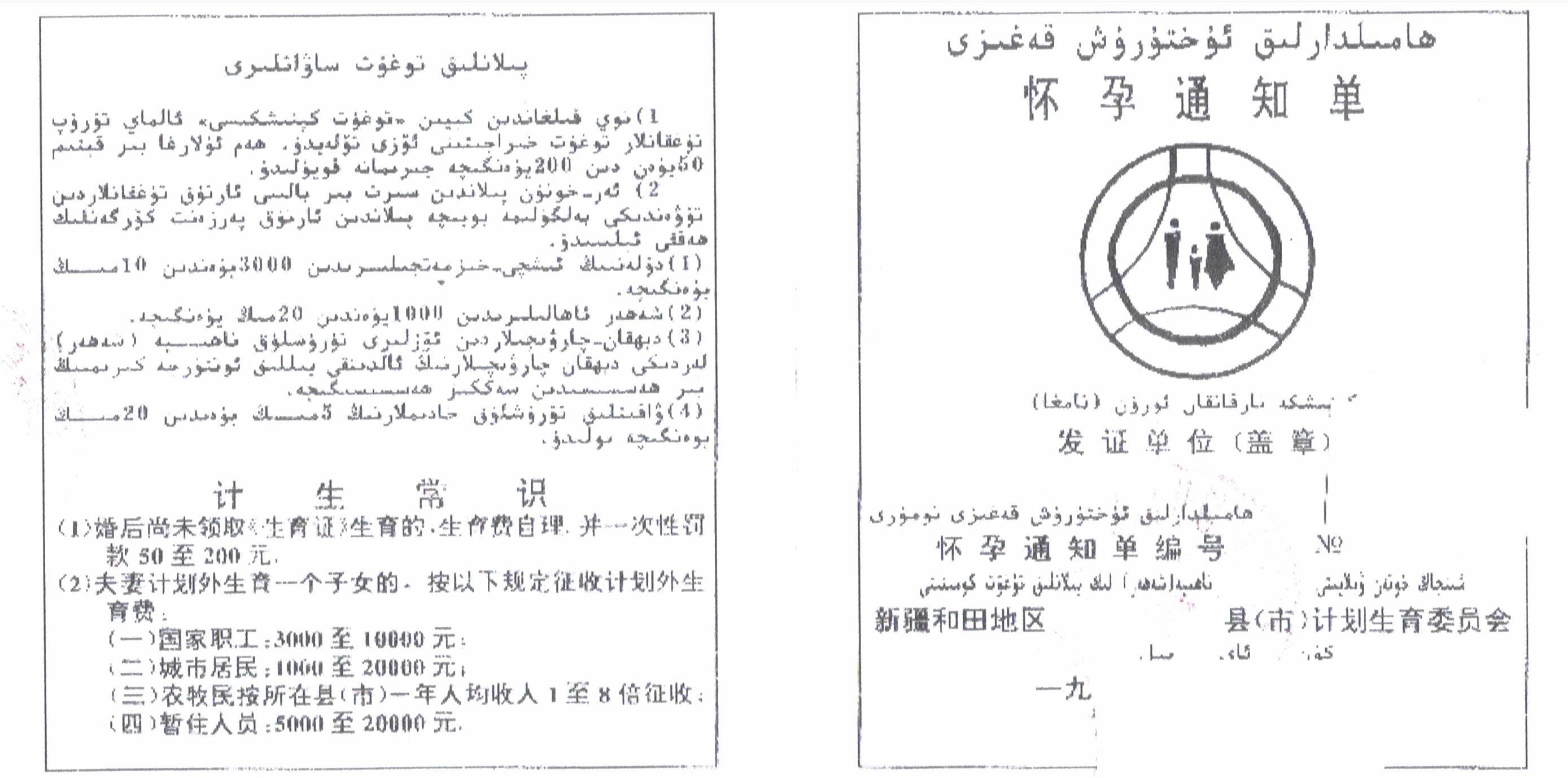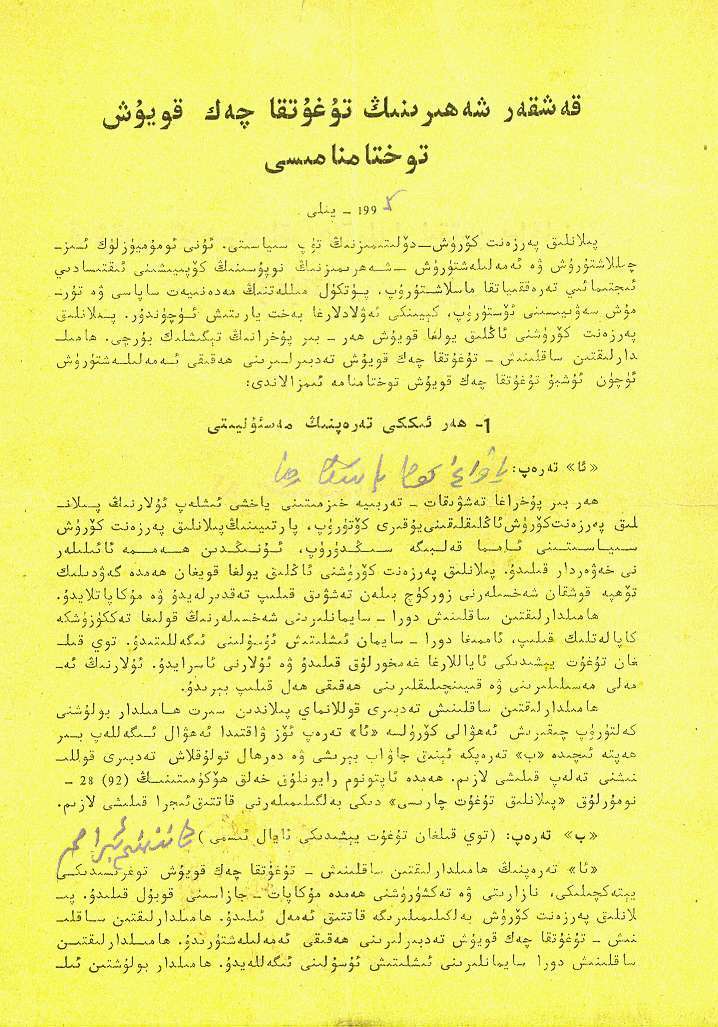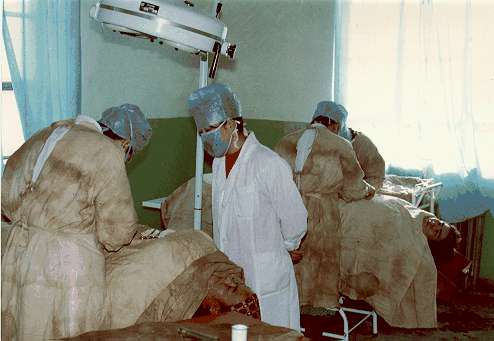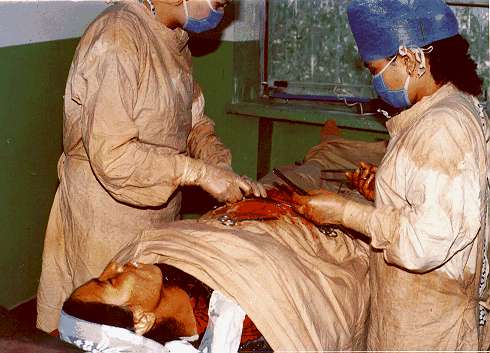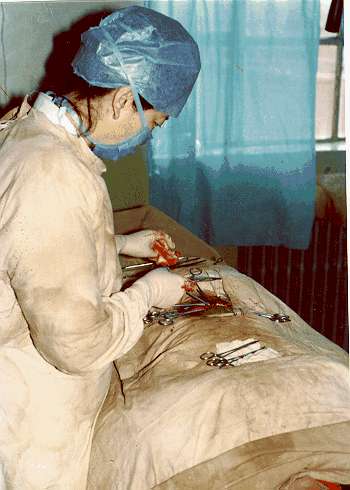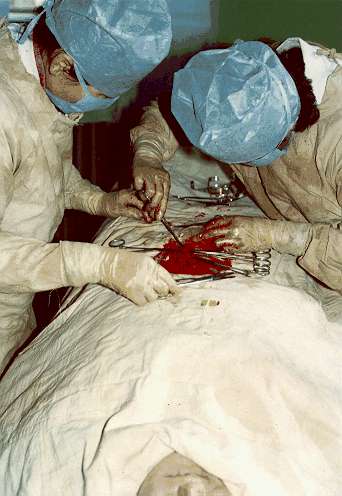Since
1988, the Chinese government has been carrying out the
notorious "birth control" policy towards the
Uighurs motivating this by the excessive population in
China. Depriving the Uighurs the access to the wealth
generated by exploiting natural resources of East
Turkistan and opportunities for prosperity, the
Chinese authorities “fight” the poverty among
Uighurs by reducing the size of the Uighur people,
which is officially regarded a minority nationality.
The
policy is supposed to increase the per capita wealth
in the region by reducing the size of the population.
But, in fact, the strict inhuman “birth control”
measures towards the Uighurs are combined with the
massive population transfer into East Turkistan from
China’s inner provinces. Taking into account that
the population of China is 1.3 billion people and that
the Uighurs account only for its 0.006 %, this means
that East Turkistan will continue to have a low per
capita wealth regardless the effects of birth control
towards the Uighurs. Therefore, the Chinese
authorities have different reasons for imposing the
birth control onto Uighurs.
The
"birth control" in East Turkistan does not
aim at improving the living standards of the Uighurs.
It is a Chinese form of ethnic cleansing of the
territory of East Turkistan from the Uighurs to create
the “living space” for Chinese migrants. The
forced implementation of the "birth control"
policy towards the Uighurs is a very serious crime
against the Uighur people, Islamic religion, and human
rights.
East Turkistan Information Center
obtained the full text of the document issued by the
Hotan Communist Party Committee “On further
strengthening of the birth control policy”.
The Hotan Prefecture is the poorest area in East
Turkistan densely populated by Uighurs. Uighurs
comprise 95% of its population 90% of which is
peasantry. Therefore, the document can be viewed as
the outline of the demographic policy of the Chinese
communist party towards the Uighur population in
general.
The
first section of the document, under the title “Real
strengthening of the leadership over the birth control”,
explains the importance of the leadership’s role in
improving the implementation of the birth control
policy. According to the document, the top leadership
must consider the birth control policy as one of their
main tasks, the first and second rank leadership is
responsible for the implementation, and cadres of the
lower three levels, those of districts, towns and
villages, must actively participate in birth control
actions. Thus, although there are special offices and
workers responsible for the implementation of the
birth control policy, the communist party requires
that “all cadres were involved in this campaign”.
Another
paragraph of the document, called “A special
double checking of all children born between the
beginning of 1998 to April 2000”, warns the
ranking officials of strict punishments for a failure
in implementing the birth control policy. If a
child born after 2000 and beyond the plan is revealed,
the work of the first leaders will be inspected and
the necessary punishment will be determined. If one
“extra” child is revealed in a village, the
head of the village will be deprived of his ten days
salary. If several children are revealed, the
officials will be dismissed from their positions for
hiding the facts, and the police may investigate their
cases. Thus, the Chinese Communist Party
puts a strong pressure on local authorities in the
implementation of the birth control policy.
Each
administrative unit is given a births quota. Birth
control workers forcibly take all women who became
pregnant beyond the quota to a doctor to have an
abortion. There were cases when babies were taken off
their mothers’ wombs just a few days before their
due dates. Forcible abortions of women very often
cause permanent psychological and physical damages and
make the women unable to bear children in the future.
The
following incident of a brutal treatment of a pregnant
woman took place in the city of Turfan. A Uighur
woman Hayrinisahan aged 32 married Ahmetjan aged 36.
For both of them, it was a second marriage and each of
them had a child from the previous marriage who lived
with the parents. Hayrinisahan and Ahmetjan decided to
have a common child believing that they are allowed to
have another child since this is their second marriage.
When
Hayrinisahan was five months pregnant, the birth
control workers found out about her pregnancy and
demanded from Hayrinisahan to have an abortion since
her pregnancy was beyond the plan. A birth control
official began to visit their family every day with
his demands. Ahmetjan received a warning from his
employer that he will be expelled if they do not
“get rid” of a child.
The
poor family decided to have a fictitious divorce in
order to keep both the child and the husband’s job.
They divorced officially, and Hayrinisahan went
secretly to Pichan district to have a delivery there.
However, in a month, birth control workers detected
her and forced to return to Turfan for the abortion.
Then,
she went secretly to Tohsun district, but was found
again after two and half month period. Hayrinisahan
escaped to a remote mountainous part of Karashahar
district located 300 kilometers from Turfan. When she
was about to give a birth to a child, a birth control
official arrived with two policemen, and they
accompanied her to Turfan as if she were a criminal.
She was taken to a hospital where she delivered
a child. The baby ended up dead. The poor woman went
mad after all, and she can be met as a madwoman in the
streets of Turfan.
Section
6 of the document instructs that, in order to prevent
unplanned pregnancies among Uighur women, officials of
the birth control office must visit once a month all
families in a village and keep a list of all pregnant
women. They also have to watch women in case someone
tries to get rid of a contraceptive spiral without the
proper authorization. If a woman needs to have the
spiral taken off, this must be done only in the
district’s birth control office. Any doctor beyond
the birth control office who assists a woman to remove
the spiral must be fired and imposed the penalty of
ten thousand yuans.
The
document also requires that all women with three
children must be sterilized.
These regulations show that the Chinese
authorities use inhuman immoral uncivilized measures
to reduce the Uighur population. Nowadays, Uighur
women in East Turkistan are treated as animals.
Private lives of the women can be intervened every
moment by birth control officers, and their bodies can
be violated by forced abortions and sterilizations.
Moreover,
the Chinese authorities do not deny that birth control
offices lack modern medical equipment and that the
birth control officers often do not have a proper
training. The chances of being mistreated in the
Chinese birth control offices are very high.
Nevertheless, the women must either comply with the
authorities or be considered as a violator of the
state law.
According
to official “Hotan geziti” (the Hotan newspaper)
from September 1, long-term birth control measures had
been taken towards 30,400 Uighur women in Hotan
district only, where the total number of women in the
district was about 45,000. One can see how
aggressively and quickly the birth control
instructions of the government are being implemented.
On
June 20, 1999, 28 Uighur women from various places of
Payzavat district, aged from 25 to 34, were forced to
undergo abortions because their pregnancies were out
of the birth control plan. During these mass
operations, several Uighur women died including
Qemberhan and Mukerremhan. According to the
information provided by a doctor who is seeking a
political asylum in Germany and wants to remain
anonymous, the death rate during abortions among
Uighur women is extremely high. Besides, because of
the poverty of the Uighur people in countryside and
the lack of proper health care system, even the women
who had successful abortions have a great chance to
have medical complications in the future.



